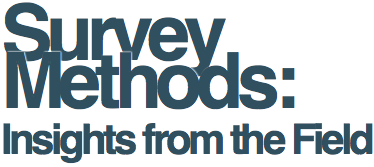Special issue: Fieldwork Monitoring Strategies for Interviewer-Administered Surveys
To achieve high quality data, optimal fieldwork monitoring strategies are essential during the data collection of surveys. A large variety of performance indicators are available and there are many opportunities to intervene if any issues are detected during the data collection phase. This special issue spotlights the lessons learned when working with different fieldwork monitoring strategies in various settings. It provides a platform to share valuable best practice knowledge and provides insights on which fieldwork strategies and tools are employed in the field.
Fieldwork Monitoring in Practice: Insights from 17 Large-scale Social Science Surveys in GermanySpecial issue
This study provides a synopsis of the current fieldwork monitoring practices of large-scale surveys in Germany. Based on the results of a standardized questionnaire, the study summarizes fieldwork monitoring indicators used and fieldwork measures carried out by 17 large-scale social sciences surveys in Germany. Our descriptive results reveal that a common set of fieldwork indicators [...]
fieldwork measures, fieldwork monitoring, key performance indicators,
Improving Central Monitoring of Fieldwork in Cross-national Surveys: The Case of the Fieldwork Management System in the European Social SurveySpecial issue
Cross-national surveys face the particular challenge of trying to balance optimal survey quality within a country with comparability across countries in terms of data quality. Addressing this challenge during fieldwork requires effective management of fieldwork data, a task made more difficult by the inherent differences between countries. This article argues that changes to the comprehensiveness, [...]
central fieldwork monitoring, cross-national surveys, data management system, data quality, ESS, face-to-face, survey management,
The utility of auxiliary data for survey response modeling: Evidence from the German Internet PanelSpecial issue
Auxiliary data are becoming more important as nonresponse rates increase and new fieldwork monitoring and respondent targeting strategies develop. In many cases, auxiliary data are collected or linked to the gross sample to predict survey response. If the auxiliary data have high predictive power, the response models can meaningfully inform survey operations as well as [...]
auxiliary data, INKAR data, interviewer observations, Microm data, Nonresponse, online panel recruitment, response propensity,
Converting Nonrespondents in PIAAC Germany 2012 Using Responsive MeasuresSpecial issue
Using paradata to modify design features during fieldwork is the earmark of responsive designs (Groves & Heeringa, 2006). One objective of responsive approaches is to improve the composition of the final sample by gaining the participation of nonrespondents. A simple but innovative attempt at realizing such a response intervention was undertaken during the fieldwork of [...]
auxiliary data, classification tree analysis, Nonresponse, paradata, PIAAC, refusal conversion, responsive measures, tailored letters,
Using field monitoring strategies to improve panel sample representativeness: Application during data collection in the Survey of Health, Ageing and Retirement in Europe (SHARE)Special issue
The Survey of Health, Ageing and Retirement in Europe (SHARE) is a multidisciplinary and cross-national face-to-face panel study of the process of population ageing. For the sixth wave of data collection, we applied an adaptive/responsive fieldwork design in the German sub-study of SHARE to test actual possibilities and effects of implementing targeted monitoring strategies during [...]
adaptive and responsive survey design, panel sample representativeness, response probability,
Developments in fieldwork procedures and monitoring in longitudinal surveys: case prioritisation and electronic contact sheets on the UK Millennium Cohort StudySpecial issue
Maximising response is important in any survey and especially so in a longitudinal survey where non-response at a particular wave contributes to attrition. A key element of response maximisation in face-to-face surveys is the adoption and implementation of thorough fieldwork procedures. The introduction of electronic sample management systems has provided more timely and accurate para-data [...]
call protocols, case prioritisation, fieldwork procedures, response propensity model, sample management,
Using Geospatial Data to Monitor and Optimize Face-to-Face FieldworkSpecial issue
Interviewers occupy a key position in face-to-face interviews. Their behavior decisively contributes to the quality of surveys. However, monitoring interviewers in face-to-face surveys is much more challenging than in telephone surveys. It is often up to the interviewer when they conduct the interviews and which addresses they work on first. Nevertheless, homogeneous fieldwork, i.e. that [...]
face-to-face, fieldwork monitoring, geographical visualization, interviewer observation, survey management,






